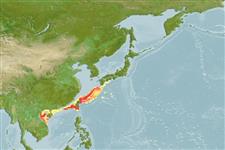Teleostei (teleosts) >
Anguilliformes (Eels and morays) >
Ophichthidae (Snake eels) > Ophichthinae
Etymology: Ophichthus: Greek, ophis = serpent + Greek, ichthys = fish (Ref. 45335); aphotistos: Named for both its appearance (aphotistos = dark or obscure) and its habitat..
More on authors: McCosker & Chen.
Environment: milieu / climate zone / depth range / distribution range
Ecology
Marine; bathydemersal; depth range 36 - 1350 m (Ref. 86730), usually 250 - 350 m (Ref. 86730). Deep-water
Northwest Pacific: Taiwan.
Length at first maturity / Size / Weight / Age
Maturity: Lm 55.4, range 48 - 62.8 cm
Max length : 62.8 cm TL (female)
Short description
Identification keys | Morphology | Morphometrics
Vertebrae: 158 - 162. Body uniformly grayish or brown to nearly black. Dorsal fin origin well behind pectoral fin tips; pectoral fin rounded, not elongate and well-developed. Posterior nostril a hole above the upper lip, covered by a flap that extends to or below the edge of the mouth. Upper lip lacks barbels between anterior and posterior nostrils. Pores small but conspicuous, SO 1 + 4, IO 4 + 2, POM 6 +2. Teeth small and conical, biserial on anterior vomer and jaws (Ref. 40865).
This species is captured by trawl over sand and muddy bottom between 36-1350 and observed from submersibles to be most abundant between 250-350 m, with only the heads exposed over sandy substrates or resting on the sediment with their bodies in S-shaped curves (Ref. 86730). Mature females collected 48-62.8 cm TL (Ref. 40865).
Life cycle and mating behavior
Maturities | Reproduction | Spawnings | Egg(s) | Fecundities | Larvae
McCosker, J.E. and Y.-Y. Chen, 2000. A new species of deepwater snake-eel, Ophichthus aphotistos, with comments on Neenchelys retropinna (Anguilliformes: Ophichthidae) from Taiwan. Ichthyol. Res. 47(4):353-357. (Ref. 40865)
IUCN Red List Status (Ref. 130435)
Threat to humans
Harmless
Human uses
Fisheries: of no interest
Tools
Special reports
Download XML
Internet sources
Estimates based on models
Preferred temperature (Ref.
123201): 11.8 - 17.3, mean 14.5 °C (based on 12 cells).
Phylogenetic diversity index (Ref.
82804): PD
50 = 0.5000 [Uniqueness, from 0.5 = low to 2.0 = high].
Bayesian length-weight: a=0.00089 (0.00039 - 0.00204), b=3.00 (2.80 - 3.20), in cm total length, based on LWR estimates for this (Sub)family-body shape (Ref.
93245).
Trophic level (Ref.
69278): 3.9 ±0.7 se; based on size and trophs of closest relatives
Resilience (Ref.
120179): Medium, minimum population doubling time 1.4 - 4.4 years (Preliminary K or Fecundity.).
Fishing Vulnerability (Ref.
59153): Moderate to high vulnerability (45 of 100).
